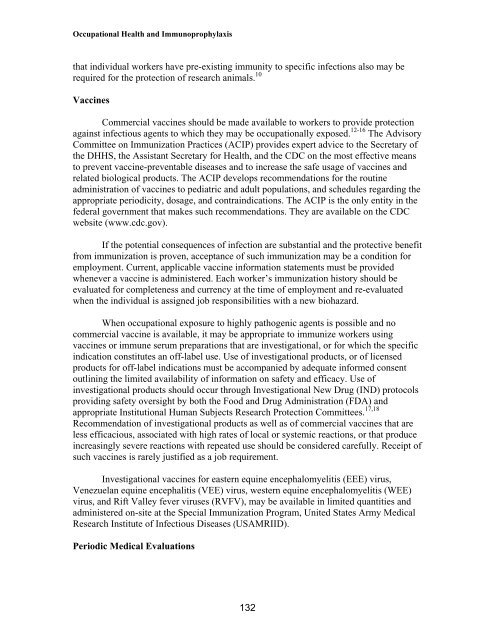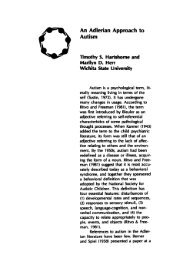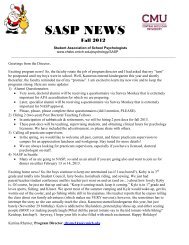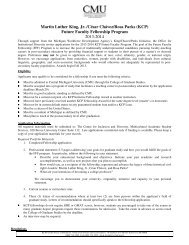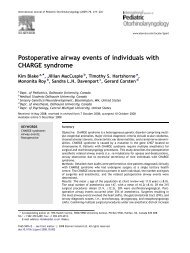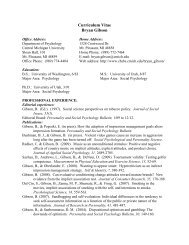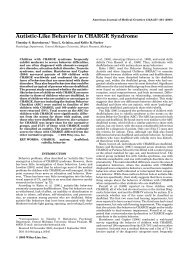- Page 1 and 2:
Biosafety in Microbiological and Bi
- Page 3 and 4:
SECTION VIII-H: Prion Diseases 299
- Page 5 and 6:
Forward Biosafety in Microbiologica
- Page 7 and 8:
Editors: L. Casey Chosewood, MD Dir
- Page 9 and 10:
Guest Editors: Matthew J. Arduino,
- Page 11 and 12:
Charles B. Millard, PhD Lieutenant
- Page 13 and 14:
Robert Bull Karen B. Byers Jane Cap
- Page 15 and 16:
Thomas L. Miller Douglas M. Moore M
- Page 17 and 18:
Robert Yarchoan Uri Yokel Lisa Youn
- Page 19 and 20:
Introduction laboratories chose not
- Page 21 and 22:
Introduction RISK CRITERIA FOR ESTA
- Page 23 and 24:
Introduction BMBL includes an impor
- Page 25 and 26:
Section II Biological Risk Assessme
- Page 27 and 28:
Biological Risk Assessment informat
- Page 29 and 30:
Biological Risk Assessment The NIH
- Page 31 and 32:
Biological Risk Assessment effectiv
- Page 33 and 34:
Biological Risk Assessment Third, m
- Page 35 and 36:
Biological Risk Assessment 14. Oxma
- Page 37 and 38:
Principles of Biosafety Safety equi
- Page 39 and 40:
Principles of Biosafety Often an in
- Page 41 and 42:
Principles of Biosafety Four standa
- Page 43 and 44:
Principles of Biosafety 4. Centers
- Page 45 and 46:
Laboratory Biosafety Level Criteria
- Page 47 and 48:
Laboratory Biosafety Level Criteria
- Page 49 and 50:
Laboratory Biosafety Level Criteria
- Page 51 and 52:
Laboratory Biosafety Level Criteria
- Page 53 and 54:
Laboratory Biosafety Level Criteria
- Page 55 and 56:
Laboratory Biosafety Level Criteria
- Page 57 and 58:
Laboratory Biosafety Level Criteria
- Page 59 and 60:
Laboratory Biosafety Level Criteria
- Page 61 and 62:
Laboratory Biosafety Level Criteria
- Page 63 and 64:
Laboratory Biosafety Level Criteria
- Page 65 and 66:
Laboratory Biosafety Level Criteria
- Page 67 and 68:
Laboratory Biosafety Level Criteria
- Page 69 and 70:
Laboratory Biosafety Level Criteria
- Page 71 and 72:
Laboratory Biosafety Level Criteria
- Page 73 and 74:
Laboratory Biosafety Level Criteria
- Page 75 and 76:
Section V Vertebrate Animal Biosafe
- Page 77 and 78:
Vertebrate Animal Biosafety Level C
- Page 79 and 80:
Vertebrate Animal Biosafety Level C
- Page 81 and 82: Vertebrate Animal Biosafety Level C
- Page 83 and 84: Vertebrate Animal Biosafety Level C
- Page 85 and 86: Vertebrate Animal Biosafety Level C
- Page 87 and 88: Vertebrate Animal Biosafety Level C
- Page 89 and 90: Vertebrate Animal Biosafety Level C
- Page 91 and 92: Vertebrate Animal Biosafety Level C
- Page 93 and 94: Vertebrate Animal Biosafety Level C
- Page 95 and 96: Vertebrate Animal Biosafety Level C
- Page 97 and 98: Vertebrate Animal Biosafety Level C
- Page 99 and 100: Vertebrate Animal Biosafety Level C
- Page 101 and 102: Vertebrate Animal Biosafety Level C
- Page 103 and 104: Vertebrate Animal Biosafety Level C
- Page 105 and 106: Vertebrate Animal Biosafety Level C
- Page 107 and 108: Vertebrate Animal Biosafety Level C
- Page 109 and 110: Vertebrate Animal Biosafety Level C
- Page 111 and 112: Vertebrate Animal Biosafety Level C
- Page 113 and 114: Vertebrate Animal Biosafety Level C
- Page 115 and 116: Vertebrate Animal Biosafety Level C
- Page 117 and 118: Vertebrate Animal Biosafety Level C
- Page 119 and 120: TABLE 1 SUMMARY OF RECOMMENDED BIOS
- Page 121 and 122: Principles of Laboratory Biosecurit
- Page 123 and 124: Principles of Laboratory Biosecurit
- Page 125 and 126: Principles of Laboratory Biosecurit
- Page 127 and 128: Principles of Laboratory Biosecurit
- Page 129 and 130: Principles of Laboratory Biosecurit
- Page 131: Occupational Health and Immunoproph
- Page 135: Occupational Health and Immunoproph
- Page 138 and 139: SECTION VIII Agent Summary Statemen
- Page 140 and 141: Agent Summary Statements - Bacteria
- Page 142 and 143: Agent Summary Statements - Bacteria
- Page 144 and 145: Agent Summary Statements - Bacteria
- Page 146 and 147: Agent Summary Statements - Bacteria
- Page 148 and 149: Agent Summary Statements - Bacteria
- Page 150 and 151: Agent Summary Statements - Bacteria
- Page 152 and 153: Agent Summary Statements - Bacteria
- Page 154 and 155: Agent Summary Statements - Bacteria
- Page 156 and 157: Agent Summary Statements - Bacteria
- Page 158 and 159: Agent Summary Statements - Bacteria
- Page 160 and 161: Agent Summary Statements - Bacteria
- Page 162 and 163: Agent Summary Statements - Bacteria
- Page 164 and 165: Agent Summary Statements - Bacteria
- Page 166 and 167: Agent Summary Statements - Bacteria
- Page 168 and 169: Agent Summary Statements - Bacteria
- Page 170 and 171: Agent Summary Statements - Bacteria
- Page 172 and 173: Agent Summary Statements - Bacteria
- Page 174 and 175: Agent Summary Statements - Bacteria
- Page 176 and 177: Agent Summary Statements - Bacteria
- Page 178 and 179: Agent Summary Statements - Bacteria
- Page 180 and 181: Agent Summary Statements - Bacteria
- Page 182 and 183:
Agent Summary Statements - Bacteria
- Page 184 and 185:
Agent Summary Statements - Bacteria
- Page 186 and 187:
Agent Summary Statements - Fungal A
- Page 188 and 189:
Agent Summary Statements - Fungal A
- Page 190 and 191:
Agent Summary Statements - Fungal A
- Page 192 and 193:
Agent Summary Statements - Fungal A
- Page 194 and 195:
Agent Summary Statements - Fungal A
- Page 196 and 197:
Agent Summary Statements - Fungal A
- Page 198 and 199:
Agent Summary Statements - Parasiti
- Page 200 and 201:
Agent Summary Statements - Parasiti
- Page 202 and 203:
Agent Summary Statements - Parasiti
- Page 204 and 205:
Agent Summary Statements - Parasiti
- Page 206 and 207:
Agent Summary Statements - Parasiti
- Page 208 and 209:
Agent Summary Statements - Parasiti
- Page 210 and 211:
Agent Summary Statements - Ricketts
- Page 212 and 213:
Agent Summary Statements - Ricketts
- Page 214 and 215:
Agent Summary Statements - Ricketts
- Page 216 and 217:
Agent Summary Statements - Viral Ag
- Page 218 and 219:
Agent Summary Statements - Viral Ag
- Page 220 and 221:
Agent Summary Statements - Viral Ag
- Page 222 and 223:
Agent Summary Statements - Viral Ag
- Page 224 and 225:
Agent Summary Statements - Viral Ag
- Page 226 and 227:
Agent Summary Statements - Viral Ag
- Page 228 and 229:
Agent Summary Statements - Viral Ag
- Page 230 and 231:
Agent Summary Statements - Viral Ag
- Page 232 and 233:
Agent Summary Statements - Viral Ag
- Page 234 and 235:
Agent Summary Statements - Viral Ag
- Page 236 and 237:
Agent Summary Statements - Viral Ag
- Page 238 and 239:
Agent Summary Statements - Viral Ag
- Page 240 and 241:
Agent Summary Statements - Viral Ag
- Page 242 and 243:
Agent Summary Statements - Viral Ag
- Page 244 and 245:
• Section VIII-F: Arboviruses and
- Page 246 and 247:
Agent Summary Statements - Arboviru
- Page 248 and 249:
Agent Summary Statements - Arboviru
- Page 250 and 251:
Agent Summary Statements - Arboviru
- Page 252 and 253:
Agent Summary Statements - Arboviru
- Page 254 and 255:
Agent Summary Statements - Arboviru
- Page 256 and 257:
Agent Summary Statements - Arboviru
- Page 258 and 259:
Agent Summary Statements - Arboviru
- Page 260 and 261:
Agent Summary Statements - Arboviru
- Page 262 and 263:
Agent Summary Statements - Arboviru
- Page 264 and 265:
Agent Summary Statements - Arboviru
- Page 266 and 267:
Agent Summary Statements - Arboviru
- Page 268 and 269:
Agent Summary Statements - Arboviru
- Page 270 and 271:
Agent Summary Statements - Arboviru
- Page 272 and 273:
Agent Summary Statements - Arboviru
- Page 274 and 275:
Agent Summary Statements - Arboviru
- Page 276 and 277:
Agent Summary Statements - Arboviru
- Page 278 and 279:
Agent Summary Statements - Arboviru
- Page 280 and 281:
Agent Summary Statements - Arboviru
- Page 282 and 283:
Agent Summary Statements - Arboviru
- Page 284 and 285:
Agent Summary Statements - Arboviru
- Page 286 and 287:
Agent Summary Statements - Toxins f
- Page 288 and 289:
Agent Summary Statements - Toxins D
- Page 290 and 291:
Agent Summary Statements - Toxins (
- Page 292 and 293:
Agent Summary Statements - Toxins r
- Page 294 and 295:
Agent Summary Statements - Toxins e
- Page 296 and 297:
Agent Summary Statements - Toxins 8
- Page 298 and 299:
Agent Summary Statements - Toxins 4
- Page 300 and 301:
Agent Summary Statement - Prion Dis
- Page 302 and 303:
Agent Summary Statement - Prion Dis
- Page 304 and 305:
Agent Summary Statement - Prion Dis
- Page 306 and 307:
Appendix A Primary Containment for
- Page 308 and 309:
Appendix A HEPA Filters. Control of
- Page 310 and 311:
Appendix A The Class II (Types A1,
- Page 312 and 313:
Appendix A Type B1 cabinet, approxi
- Page 314 and 315:
Appendix A Horizontal Laminar Flow
- Page 316 and 317:
Appendix A and increase the possibi
- Page 318 and 319:
Appendix A collection flasks should
- Page 320 and 321:
Appendix A Small spills within the
- Page 322 and 323:
Appendix A and skin from UV exposur
- Page 324 and 325:
Appendix A Annex F of NSF/ANSI 49 2
- Page 326 and 327:
Appendix A H. Vibration Test: This
- Page 328 and 329:
Appendix A Table 2. Comparison of B
- Page 330 and 331:
Appendix A Table 4. Reference for A
- Page 332 and 333:
Appendix A Figure 2. The Class I BS
- Page 334 and 335:
Appendix A Figure 4. Canopy (thimbl
- Page 336 and 337:
Appendix A Figure 6. The Class II,
- Page 338 and 339:
Appendix A Figure 9A. The horizonta
- Page 340 and 341:
Appendix A Figure 10. A modified co
- Page 342 and 343:
Appendix A Figure 13. A bag-in-bag-
- Page 344 and 345:
Appendix A 17. Barbeito M, West, D,
- Page 346 and 347:
Appendix B an item is either steril
- Page 348 and 349:
Appendix B decontamination of equip
- Page 350 and 351:
Appendix B minimum and are “sight
- Page 352 and 353:
Appendix B TABLE 2 ACTIVITY LEVELS
- Page 354 and 355:
Appendix B 8. Tearle P. Decontamina
- Page 356 and 357:
Appendix C United States Postal Ser
- Page 358 and 359:
Appendix C CDC Select Agent Program
- Page 360 and 361:
Appendix C FIGURE 1 A CATEGORY A UN
- Page 362 and 363:
Appendix C FIGURE 2 A CATEGORY B NO
- Page 364 and 365:
Appendix D The BSL-3-Ag facility ca
- Page 366 and 367:
Appendix D facility in the future.
- Page 368 and 369:
Appendix D 1. Personnel change and
- Page 370 and 371:
Appendix D acceptance of the facili
- Page 372 and 373:
Appendix D V. SUMMARIES OF SELECTED
- Page 374 and 375:
Appendix D means of transmitting th
- Page 376 and 377:
Appendix D The primary natural mode
- Page 378 and 379:
Appendix D movement permit is requi
- Page 380 and 381:
Appendix D is probably because reco
- Page 382 and 383:
Appendix D tick), A. cajennese, and
- Page 384 and 385:
Appendix D LSD is a disorder of cat
- Page 386 and 387:
Appendix D isolated from stillborn
- Page 388 and 389:
Appendix D Peste Des Petits Ruminan
- Page 390 and 391:
Appendix D movement permit is requi
- Page 392 and 393:
Appendix D The importation, possess
- Page 394 and 395:
Appendix D 21. DaMassa AJ, Holmberg
- Page 396 and 397:
Appendix D 55. Kitching RP, Mackay
- Page 398 and 399:
Appendix E Four Arthropod Containme
- Page 400 and 401:
Appendix G Integrated Pest Manageme
- Page 402 and 403:
Appendix G Preventive applications
- Page 404 and 405:
Appendix H REFERENCES 1. Doblhoff-D
- Page 406 and 407:
Each laboratory that uses toxins sh
- Page 408 and 409:
disposable plastic pipettes. Glass
- Page 410 and 411:
TABLE 1 PHYSICAL INACTIVATION OF SE
- Page 412 and 413:
f For T-2 mycotoxin and brevetoxin,
- Page 414 and 415:
23. Robinson JP. Annex 2. Toxins. I
- Page 416 and 417:
Appendix J 4. Approval by the IBC p
- Page 418 and 419:
Appendix K Atlanta, Georgia 30333 T
- Page 420 and 421:
Appendix K USDA, Agriculture Select
- Page 422 and 423:
Appendix L Acronyms ABSA ABSL ABSL-
- Page 424:
Appendix L NIH Guidelines NIOSH OBA


